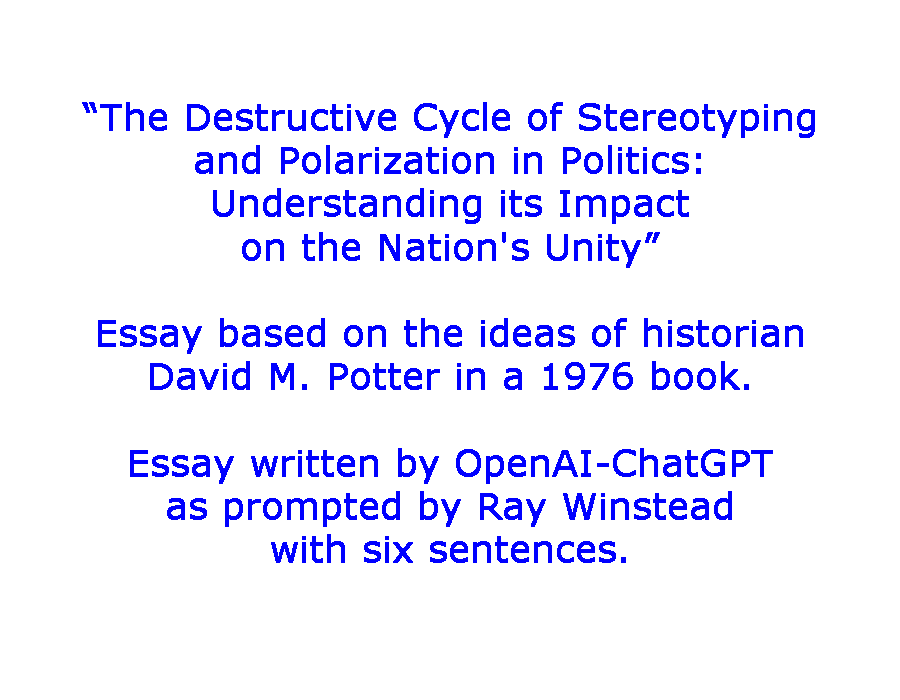
"The Destructive Cycle of Stereotyping and Polarization in Politics: Understanding its Impact on the Nation's Unity"

"The Destructive Cycle of Stereotyping and Polarization in Politics: Understanding its Impact on the Nation's Unity"
Introduction
The process of substituting stereotypes for realities and its subsequent effect on political polarization has far-reaching consequences for the spirit and unity of a country. This essay will explore the interrelation between these two ideas and how they exacerbate the fragmentation of society. As stereotypes replace nuanced understandings, opposing groups lose sight of their shared values and similarities. Consequently, politics becomes less about finding common ground and more about entrenched dogma, turning disagreements into battles of principle and abstractions into points of contention. This divisive tendency ultimately leads to a polarized environment where political action transforms from accommodation to combat. Despite the majority's disapproval, the cycle seems unstoppable. An important question emerges concerning the hierarchy of values within opposing groups, as understanding these priorities might help alleviate the detrimental effects of stereotyping and polarization.
1. Stereotypes and the Erosion of Shared Values
Stereotyping occurs when individuals or groups are reduced to simplistic, preconceived notions, ignoring their complexities and shared values. When opposing groups fall into this trap, they lose sight of the common ground they share. Stereotypes create an "us versus them" mentality, making it challenging to find common interests and collaborative solutions to societal issues. This loss of shared values contributes to the growing division in the country, as people become increasingly polarized and alienated from one another.
2. Political Polarization: From Disputes to Dogma
The substitution of stereotypes for realities has a profound impact on people's attitudes towards disagreements in politics. Ordinary disputes, which should be open to negotiation and compromise, become questions of principle entrenched in rigid, unnegotiable dogma. This shift causes individuals to view opposing political beliefs not as legitimate differences of opinion but as threats to their identity and way of life. Consequently, political discourse becomes less about problem-solving and more about winning battles, further intensifying polarization.
3. Abstractions and Contentious Politics
As the process of substituting stereotypes for realities continues, abstractions take center stage, becoming points of honor and contention. This is particularly dangerous for the functioning of government. When debates are no longer focused on practical policies but instead revolve around abstract ideals, it becomes challenging to reach consensus and make progress. Such political infighting weakens the government's ability to address critical issues effectively, rocking it to its very foundation.
4. From Accommodation to Combat
The polarization of the political environment transforms political action from a process of accommodation to a mode of combat. Instead of seeking compromise and finding common ground, politicians and citizens alike resort to extreme positions, demonizing the other side and perpetuating the cycle of division. The quest for power and ideological dominance takes precedence over cooperation and collective welfare, leading to an unproductive and hostile political landscape.
5. The Unstoppable Cycle of Division
Once the divisive tendency sets in, it becomes challenging to reverse the process of polarization. The increased rivalry and tensions surrounding all issues perpetuate the cycle, making it nearly impossible for the majority of Americans to stop this trend, even if they deplore its consequences. The echo chambers of social media and the reinforcement of biased information further contribute to this self-perpetuating cycle, isolating individuals from diverse perspectives and deepening existing divisions.
6. Understanding the Hierarchy of Values
In the face of mounting polarization, understanding the hierarchy of values within opposing groups becomes crucial. By recognizing the core priorities and concerns that drive different political beliefs, it might be possible to find common ground and initiate productive dialogue. Building empathy and respect for the values and aspirations of others can help break down stereotypes and humanize the "other side."
Conclusion
The process of substituting stereotypes for realities and the ensuing political polarization has profound implications for a nation's unity and collective well-being. Stereotypes erode shared values and hinder understanding between opposing groups, leading to a combative political atmosphere where abstractions and rigid dogmas overshadow practical problem-solving. Despite the majority's disapproval, the divisive tendency seems unstoppable. However, by seeking to understand the hierarchy of values within opposing groups, we may begin to bridge the gap and move toward a more empathetic and constructive political discourse. Only through recognizing our shared humanity and values can we hope to heal the divisions that plague our society.
Essay based on the ideas of historian David M. Potter in a 1976 book. Essay written by OpenAI-ChatGPT as prompted by Ray Winstead with six sentences.
| Front Page |
Dr. Winstead's Blood Pressure Tracker: Free Templates for Graphing Blood Pressure in Microsoft Excel
Dr. Winstead's Current Local and World Standard Percentage Metric Time Clock